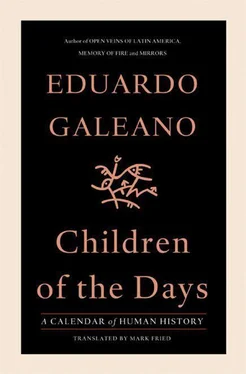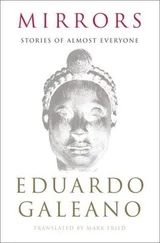May 20. A RARE ACT OF SANITY
In 1998 France passed a law that reduced the workweek to thirty-five hours.
Work less, live more: Thomas More dreamed of this in Utopia , but we had to wait five centuries before a country finally dared commit such an act of common sense.
After all, what are machines for if not to reduce the time we spend working and to lengthen our hours of freedom? Why does technological progress have to come bearing the gifts of anguish and unemployment?
For once, at least, a country dared to challenge all that nonsense.
Sanity did not last. When the thirty-five-hour week was ten years old, it expired.
May 21. WORLD DAY FOR CULTURAL DIVERSITY
In 1906 a pygmy captured in the jungle of the Congo arrived at the Bronx Zoo in New York.
He was named Ota Benga and was exhibited to the public in a cage along with an orangutan and four chimpanzees. The experts explained that this humanoid might represent the missing link, and to confirm their hypothesis they displayed him playing with his hairy brothers.
Sometime later the pygmy was rescued by Christian charity.
They did what they could but it was hopeless. Ota Benga refused to be saved. He would not speak, broke dishes at the table, hit anyone who tried to touch him. He was incapable of working any job, remained silent in the church choir and bit whoever tried to have a picture taken with him.
At the end of the winter of 1916, after ten years of domestication, Ota Benga sat down in front of a fire, took off and burned the clothing he had been obliged to wear, then trained the pistol he had stolen on his heart.
May 22. TINTIN AMONG THE SAVAGES
On this day in 1907 Belgian cartoonist Hergé, the father of comic-book hero Tintin, was born.
Tintin incarnated the civilizing virtues of the white race.
In his best-selling adventure, Tintin visited the Congo, still owned by Belgium, and there he laughed heartily at the ridiculous doings of black people and entertained himself hunting.
He shot fifteen antelope, skinned a monkey for a disguise, blew up a rhinoceros with a stick of dynamite and stuck a gun into the open mouths of many crocodiles and pulled the trigger.
Tintin said that elephants spoke much better French than black people. For a souvenir he killed one and pulled out its ivory tusks.
The trip was a lot of fun.
May 23. MANUFACTURING POWER
In 1937 John D. Rockefeller, owner of the world, king of oil, founder of Standard Oil Company, passed away.
He had lived for nearly a century.
The autopsy found not a single scruple.
May 24. THE HERETICS AND THE SAINT
This day in the year 1543 marked the end of Nicolaus Copernicus’s life.
He died as the first copies of his book, which demonstrated that the earth moved around the sun, went into circulation.
The Church condemned the book as “false and altogether contrary to Holy Scripture,” sent the priest Giordano Bruno to the stake for spreading its ideas, and obliged Galileo Galilei to deny he had read and believed it.
Three and a half centuries later, the Vatican repented of roasting Giordano Bruno alive and announced it would erect a statue of Galileo in its gardens.
God’s embassy on earth takes its time to rectify things.
But even as the Vatican pardoned these heresies, it beatified Cardinal Inquisitor Roberto Bellarmino — Saint Robert who art in heaven — the man who charged and sentenced Bruno and Galileo.
In the year 325 in the city of Nicaea, Emperor Constantine I convened the first ecumenical council of Christendom. During the three months it sat, the three hundred bishops in attendance approved a creed vital for the struggle against heresy, and decided that the word “heresy,” from the Greek hairesis , which means “choice,” from then on would mean “error.”
In other words, whoever freely chooses to disobey the owners of the faith is wrong.
May 26. SHERLOCK HOLMES DIED TWICE
The first death of Sherlock Holmes occurred in 1891. His father killed him: the writer Arthur Conan Doyle couldn’t stand the fact that his pedantic offspring was more famous than he was. So, up in the Alps he threw Sherlock off a cliff.
The news came out shortly thereafter in Strand magazine. Then the whole world dressed in mourning, the magazine lost readers and the writer lost friends.
The resurrection of the most famous of all detectives was not long in coming.
Conan Doyle had no choice but to bring him back to life.
Of Sherlock’s second death nothing is known. No one answers the telephone in his Baker Street home. His time must have come by now because we all have to die, though it is curious that his obituary has never appeared in the Times .
Fernando passed away today in 1963.
He was a free spirit who belonged to everyone and to no one.
When he tired of chasing cats across squares, he’d hit the streets with his singing and guitar-playing buddies and rumba with them from party to party, always chasing the music wherever it happened to be.
He never missed a concert. A critic with a cultivated ear, he’d wag his tail if he liked what he heard, growl if he didn’t.
Whenever the dogcatcher got hold of him, a crowd would set him free. Whenever a car nipped him, the best doctors would take him in and treat him.
His carnal sins, committed in the middle of the street, tended to be punished with swift kicks that left him limping, and then the children’s brigade of the Progreso Club would give him intensive care.
Three statues of Fernando grace his city, Resistencia, in Argentina’s Chaco.
Today in the year 2006, Pope Benedict, the supreme pontiff of the Roman Catholic Church, took a walk in the gardens of the city called, in Polish, Oświęcim.
At a certain point the scenery changed.
In German the city of Oświęcim is called Auschwitz.
And in Auschwitz, the pope spoke. From the most famous death factory in the world, he asked, “And God, where was He?”
No one told him that God had never changed his address.
He asked, “Why did God remain silent?”
No one pointed out that it was the Church that remained silent, the Church that spoke in God’s name.
In the summer of 1725, Petar Blagojevic got out of his coffin in the village of Kisiljevo, bit nine neighbors and drank their blood. By order of the Austrian government, then in charge in these parts, the forces of order killed him definitively by driving a stake through his heart.
Petar was the first officially recognized vampire, and the least famous.
The most successful, Count Dracula, was born from the pen of Bram Stoker in 1897.
More than a century later Dracula retired. What forced him out wasn’t the competition from the silly little vampires of Hollywood, which didn’t bother him in the least. No, he was tormented by feats of a different magnitude.
Faced with the mighty gluttons who founded banks then made them founder, swilling blood as if the whole world were a neck, he knew his inferiority complex was terminal.
May 30. FROM THE STAKE TO THE ALTAR
On this day in 1431, a nineteen-year-old girl was burned alive in the old marketplace at Rouen.
She climbed the scaffold wearing an enormous cap, which said:
Heretic ,
Recidivist ,
Apostate ,
Idolatress .
After she was burned to death, her body was thrown from a bridge into the Seine, so the waters would carry her far away.
Читать дальше












